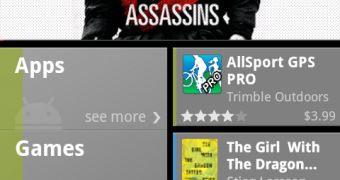There are plenty of reasons why Amazon's upcoming, but unconfirmed, Kindle tablet, may be the first truly successful Android tablet. The hardware is decent and the pricing is great, for one. But that wouldn't be enough, the key is all of the content Amazon can provide, everything a few taps away.
Google, on the other hand, has fewer content avenues and it does a poor job promoting them in Android anyway.
Google is making some inroads, YouTube is great for short clips, but professional content is harder to come by and movies or TV shows are a rarity.
Google has no music store and its eBookstore is not comparable to the Kindle store.
But there's another, more subtle reason, why Amazon can pull off what Google hasn't, and using Google's operating system to do it: payments.
Amazon has a treasure trove of financial information, the vast majority of the site's users have provided credit card data. When they want to buy something, all it takes is a few clicks. What's more, they know exactly who they're paying, Amazon.
This is true for items on the site, MP3s, movies and ebooks, but it's also true for applications in the Amazon App Store.
In the Android Market, most people are unsure who they're paying or how, one explanation for the poor sales numbers most Android apps see.
Google's Checkout payments system has never taken off and few people use it, compared to large sites like Amazon, which is its own payments provider, so to speak, or PayPal. Apple has financial details on most of its iTunes and App Store users.
The importance of this can't be underestimated, with great access to content, including apps, and a simple way of paying for it, Amazon Kindle tablet users are going to find a lot more use for their device than vanilla Android tablet buyers.

 14 DAY TRIAL //
14 DAY TRIAL //